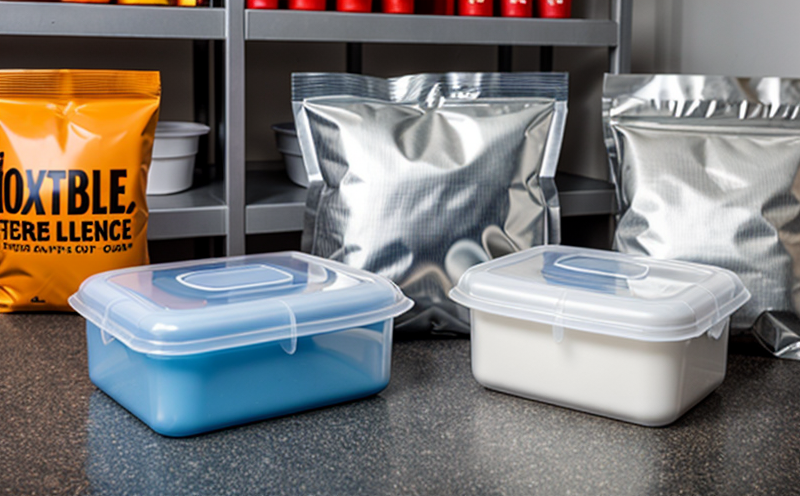ISO 7765-1 Pendulum Impact Test for Films
The ISO 7765-1 pendulum impact test is a critical assessment method used to evaluate the toughness and resistance of plastic films, particularly those employed in flexible packaging. This standardized procedure quantifies the energy absorption capabilities of various film types under dynamic impact conditions using a pendulum hammer. Understanding this test’s intricacies is essential for quality managers, compliance officers, R&D engineers, and procurement teams.
The pendulum hammer delivers a controlled impact to the specimen, simulating real-world scenarios where films may encounter mechanical stress due to handling or use. The absorbed energy during these tests provides insights into the materials' durability, enabling manufacturers to make informed decisions about material selection and process optimization.
Compliance officers rely on such tests to ensure that packaging meets regulatory standards, particularly those related to safety and performance in challenging environmental conditions. R&D engineers use this method as part of their ongoing efforts to innovate and improve product design. For procurement teams, understanding the results from these tests can inform decisions about supplier selection and material sourcing.
The pendulum impact test is applicable across various sectors, including food packaging, pharmaceuticals, consumer goods, and e-commerce. In each sector, it plays a crucial role in ensuring that flexible films meet stringent performance requirements. The test's robustness and reliability make it an indispensable tool for quality assurance processes.
For instance, in the food packaging industry, the pendulum impact test ensures that films used to package perishable goods can withstand handling without compromising integrity or safety. Similarly, in pharmaceutical packaging, this test guarantees that protective layers remain intact during transit and storage. The pendulum impact test also supports sustainable practices by identifying materials with enhanced toughness that can reduce waste and improve recyclability.
The test is conducted according to ISO 7765-1:2019, which specifies the procedure for determining the energy absorbed by films under a pendulum impact. The apparatus consists of a pendulum hammer and a testing machine capable of delivering controlled impacts at specified heights. Specimens are prepared by cutting them into standard sizes, typically rectangular shapes with specific dimensions.
The pendulum hammer is raised to a predetermined height and released to strike the film specimen placed on a rigid support plate. The impact energy absorbed by the film is measured using strain gauges or other suitable sensors attached to the testing machine. The absorbed energy is then calculated based on the difference in potential energy before and after the impact.
The test results are typically reported as the average value of several replicate measurements, ensuring consistency and reliability. Compliance with ISO 7765-1 ensures that packaging materials meet global standards for toughness and durability, which is critical for international trade and regulatory compliance.
Understanding the parameters involved in this test can help manufacturers optimize their processes to achieve optimal results. Factors such as film thickness, composition, and surface finish all influence the energy absorption properties of films. Engineers often conduct pilot tests to fine-tune these variables before full-scale production.
Industry Applications
The ISO 7765-1 pendulum impact test is widely used across various industries, with particular relevance in sectors that rely heavily on flexible packaging. Food packaging and pharmaceuticals are two primary areas where this test holds significant importance.
In the food packaging industry, ensuring the integrity of films used to package perishable goods is paramount. The pendulum impact test helps verify that these films can withstand handling and transportation without compromising product safety or quality. By meeting stringent performance criteria, manufacturers can enhance consumer trust and satisfaction.
Pharmaceutical packaging also benefits greatly from this testing method. Protective layers must remain intact during transit to ensure the efficacy of medications. The pendulum impact test ensures that films used in these applications meet the highest standards for integrity and durability.
The e-commerce sector has seen a significant rise in flexible packaging use, driven by the need for efficient shipping and storage solutions. The pendulum impact test plays a crucial role here as well, ensuring that films can withstand the rigors of delivery without affecting product quality.
Environmental and Sustainability Contributions
- The ISO 7765-1 pendulum impact test contributes positively to environmental sustainability by promoting the use of materials that are tougher and more resilient. This reduces waste generation by extending product lifecycles.
- By ensuring that films meet robust performance standards, this test supports recycling initiatives, as more durable materials can be recycled more effectively.
Use Cases and Application Examples
The pendulum impact test is a cornerstone of quality assurance processes in flexible packaging manufacturing. It allows engineers to identify the optimal balance between film toughness, flexibility, and cost.
A case study involving a leading food manufacturer illustrates this point. By implementing the ISO 7765-1 test, they were able to enhance the durability of their packaging films without sacrificing flexibility or cost-effectiveness. This resulted in reduced waste during production and improved product safety during handling and transportation.
In another example from the pharmaceutical industry, a leading company used this test to ensure that their film packaging met stringent international standards for integrity and performance. The results enabled them to secure regulatory approvals, thereby expanding market reach and customer trust.





